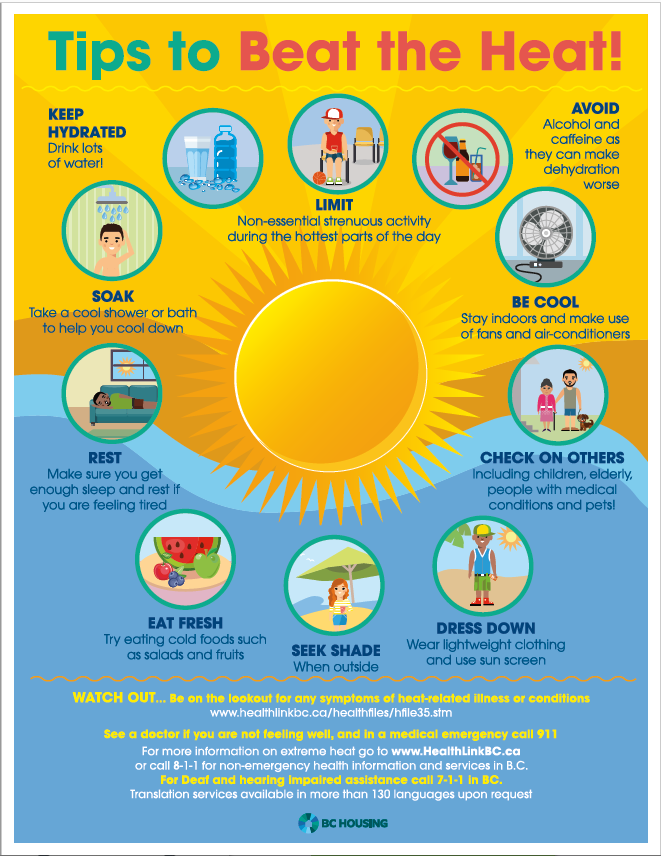We are expecting hotter than normal temperatures in the coming days.
The splash pad at the Esquimalt Adventure Park will be turned on for the May 12-14 weekend and for summer after May 19 (10AM-7PM)
 Watch for these signs of heat exhaustion
Watch for these signs of heat exhaustion
- Pale, cool, moist skin
- Heavy sweating, cramps, rash
- Fatigue, lightheadedness, headache
- Nausea, vomiting
- High fever, hallucinations, seizures and unconsciousness require urgent medial attention. Call 9-1-1
Fountains in Esquimalt parks
- Saxe – right beside main parking lot
- High Rock – just off pathway in the meadow (dog off leash area)
- Memorial – right beside Portland Loo/ playground
- West Bay – entrance of the walkway
- Gorge – by men’s washroom on Nature House
- Adventure Park – lion's head fountain by picnic tables
Esquimalt facilities for keeping cool
- Esquimalt Recreation Centre- indoor fountains and washrooms
- Gorge Park Pavilion- indoor fountains and washrooms
- Esquimalt branch of the Greater Victoria Public Library
Waterways and beach access
There are several entry points to access the ocean. See the list.
Open our interactive map to easily find beach access, fountains and facilities.
General heat safety information
PreparedBC - Extreme Heat Preparedness Guide. A roadmap to help you, your family, and your community prepare for extreme heat events.
- Download our printable heat safety information brochure
Being active in a heatwave
Know your risks
Being physically active provides many health benefits, but during extreme heat it can put you at risk even if you are healthy. Your risk increases if you have:
- breathing difficulties;
- heart problems;
- hypertension; or
- kidney problems.
If you are taking medication or have a health condition, ask your doctor or pharmacist if it increases your health risk in the heat and follow their recommendation.
Heat illnesses can include heat stroke, heat exhaustion, heat fainting, heat edema (swelling of hands, feet and ankles), heat rash and heat cramps (muscle cramps) and are mainly caused by over-exposure to extreme heat or over-exertion for a person’s age and physical condition.
Watch your child’s health closely during a heatwave.
Stay alert for symptoms of heat illness. They include:
- changes in behaviour (sleepiness or temper tantrums);
- dizziness or fainting;
- nausea or vomiting;
- headache;
- rapid breathing and heartbeat;
- extreme thirst; and
- decreased urination with unusually dark yellow urine.
If you see any of these signs during extreme heat, immediately move the child to a cool place and give liquids. Water is best. If you are breastfeeding your child, breast milk will provide adequate hydration, but remember to keep yourself hydrated so you can produce a sufficient amount of milk.
Heat stroke is a medical emergency
Call 911 or your local emergency number immediately if you are caring for a child who has a high body temperature and is unconscious, confused, or has stopped sweating.
While waiting for help – cool the child right away by:
- moving them to a cool place;
- applying cold water to large areas of the skin or clothing; and
- fanning the child as much as possible.
Children most at risk include those with breathing difficulties (asthma), heart conditions, kidney problems, mental and physical disabilities, developmental disorders, diarrhea, and those who take certain medications. Ask your doctor or pharmacist if the medication increases risk to their health in the heat and follow their recommendations.
